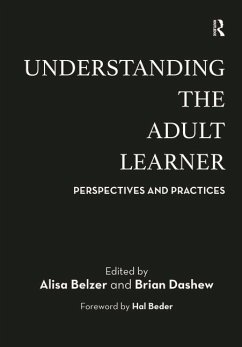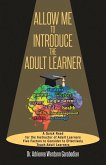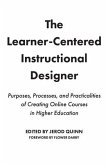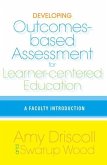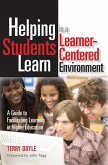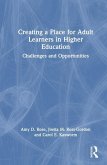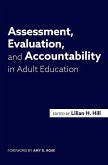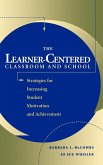Understanding the Adult Learner
Perspectives and Practices
Herausgeber: Belzer, Alisa; Dashew, Brian
Understanding the Adult Learner
Perspectives and Practices
Herausgeber: Belzer, Alisa; Dashew, Brian
- Gebundenes Buch
- Merkliste
- Auf die Merkliste
- Bewerten Bewerten
- Teilen
- Produkt teilen
- Produkterinnerung
- Produkterinnerung
Adults seek out learning for very different reasons in different contexts, and this book is intended to support adult educators' development in responding to this rich array.
Andere Kunden interessierten sich auch für
![Allow Me To Introduce The Adult Learner Allow Me To Introduce The Adult Learner]() Adrienne Werdann GarabedianAllow Me To Introduce The Adult Learner11,99 €
Adrienne Werdann GarabedianAllow Me To Introduce The Adult Learner11,99 €![The Learner-Centered Instructional Designer The Learner-Centered Instructional Designer]() The Learner-Centered Instructional Designer185,99 €
The Learner-Centered Instructional Designer185,99 €![Developing Outcomes-Based Assessment for Learner-Centered Education Developing Outcomes-Based Assessment for Learner-Centered Education]() Amy DriscollDeveloping Outcomes-Based Assessment for Learner-Centered Education44,99 €
Amy DriscollDeveloping Outcomes-Based Assessment for Learner-Centered Education44,99 €![Helping Students Learn in a Learner-Centered Environment Helping Students Learn in a Learner-Centered Environment]() Terry DoyleHelping Students Learn in a Learner-Centered Environment36,99 €
Terry DoyleHelping Students Learn in a Learner-Centered Environment36,99 €![Creating a Place for Adult Learners in Higher Education Creating a Place for Adult Learners in Higher Education]() Amy D. RoseCreating a Place for Adult Learners in Higher Education185,99 €
Amy D. RoseCreating a Place for Adult Learners in Higher Education185,99 €![Assessment, Evaluation, and Accountability in Adult Education Assessment, Evaluation, and Accountability in Adult Education]() Assessment, Evaluation, and Accountability in Adult Education185,99 €
Assessment, Evaluation, and Accountability in Adult Education185,99 €![The Learner-Centered Classroom and School The Learner-Centered Classroom and School]() Barbara L McCombsThe Learner-Centered Classroom and School46,99 €
Barbara L McCombsThe Learner-Centered Classroom and School46,99 €-
-
-
Adults seek out learning for very different reasons in different contexts, and this book is intended to support adult educators' development in responding to this rich array.
Hinweis: Dieser Artikel kann nur an eine deutsche Lieferadresse ausgeliefert werden.
Hinweis: Dieser Artikel kann nur an eine deutsche Lieferadresse ausgeliefert werden.
Produktdetails
- Produktdetails
- Verlag: Routledge
- Seitenzahl: 318
- Erscheinungstermin: 7. April 2023
- Englisch
- Abmessung: 260mm x 183mm x 22mm
- Gewicht: 796g
- ISBN-13: 9781642672329
- ISBN-10: 1642672327
- Artikelnr.: 66406791
- Herstellerkennzeichnung
- Libri GmbH
- Europaallee 1
- 36244 Bad Hersfeld
- gpsr@libri.de
- Verlag: Routledge
- Seitenzahl: 318
- Erscheinungstermin: 7. April 2023
- Englisch
- Abmessung: 260mm x 183mm x 22mm
- Gewicht: 796g
- ISBN-13: 9781642672329
- ISBN-10: 1642672327
- Artikelnr.: 66406791
- Herstellerkennzeichnung
- Libri GmbH
- Europaallee 1
- 36244 Bad Hersfeld
- gpsr@libri.de
Alisa Belzer is a Professor at the Rutgers University Graduate School of Education and program coordinator for the online EdM in Adult and Continuing Education. Her research focuses on adult literacy education policy, professional development, and adult learner experiences. Funded by the Dollar General Foundation, she is currently developing a mobile app for adult developing readers called URead. Brian Dashew is currently Head of Learning & Development for North America for GroupM, a leading media investment company. Previously, he was an assistant professor of practice in adult and continuing education at Rutgers University, and prior to that, he was an assistant dean at Columbia University for over seven years.
Foreword -Part I: Setting the Stage 1 Foundational Concepts and Commitments
for Adult Learning 2 Creating Inclusive Learning Spaces for a Diverse
World: The Womanist Perspective 3 The Democratic Impulse in Adult Education
Part II: Internal Influences and the Learner 4 Motivating Adult Learners5
Minding the Brain: The Emotional Foundations of Adult Learning 6 The Role
of Emotion-Laden Experiences in Self-Formation 7 Adult Development: Robert
Kegan's Constructive Development Theory Part III: Adult Learning Processes
and Approaches 8 Structured Silences in Adult Learning Theory 9 Andragogy:
The Philosophy Behind the Practice 10 Self-Directed learning: A 21st
Century Imperative 11 Experiential Learning: Defining Parameters,
Contextual Foundations, and Influential Contributions 12 Transformative
Learning: Evolving Theory for Understanding Change 13 Digital Learning and
the Promise of Connectivism for Adult Education Part IV: Conclusions 14
Instructional Design 15 Next Steps: Interrogating and Using Theory, About
the Authors. IndexAdults seek out learning for very different reasons in
different contexts, and this book is intended to support adult educators'
development in responding to this rich array. There is no single way to be
an adult learner, and so it should not be surprising that there is no
single way to be an adult educator. However, the authors believe that all
educators must demonstrate a commitment to meeting adult learners where
they are. Adult educators should help learners move forward not only with
new content knowledge, information, and skills, but also with new ways of
making meaning and seeing themselves, their role, and the world. This
volume introduces many theories and concepts that can help adult educators
do this effectively.
for Adult Learning 2 Creating Inclusive Learning Spaces for a Diverse
World: The Womanist Perspective 3 The Democratic Impulse in Adult Education
Part II: Internal Influences and the Learner 4 Motivating Adult Learners5
Minding the Brain: The Emotional Foundations of Adult Learning 6 The Role
of Emotion-Laden Experiences in Self-Formation 7 Adult Development: Robert
Kegan's Constructive Development Theory Part III: Adult Learning Processes
and Approaches 8 Structured Silences in Adult Learning Theory 9 Andragogy:
The Philosophy Behind the Practice 10 Self-Directed learning: A 21st
Century Imperative 11 Experiential Learning: Defining Parameters,
Contextual Foundations, and Influential Contributions 12 Transformative
Learning: Evolving Theory for Understanding Change 13 Digital Learning and
the Promise of Connectivism for Adult Education Part IV: Conclusions 14
Instructional Design 15 Next Steps: Interrogating and Using Theory, About
the Authors. IndexAdults seek out learning for very different reasons in
different contexts, and this book is intended to support adult educators'
development in responding to this rich array. There is no single way to be
an adult learner, and so it should not be surprising that there is no
single way to be an adult educator. However, the authors believe that all
educators must demonstrate a commitment to meeting adult learners where
they are. Adult educators should help learners move forward not only with
new content knowledge, information, and skills, but also with new ways of
making meaning and seeing themselves, their role, and the world. This
volume introduces many theories and concepts that can help adult educators
do this effectively.
Foreword -Part I: Setting the Stage 1 Foundational Concepts and Commitments
for Adult Learning 2 Creating Inclusive Learning Spaces for a Diverse
World: The Womanist Perspective 3 The Democratic Impulse in Adult Education
Part II: Internal Influences and the Learner 4 Motivating Adult Learners5
Minding the Brain: The Emotional Foundations of Adult Learning 6 The Role
of Emotion-Laden Experiences in Self-Formation 7 Adult Development: Robert
Kegan's Constructive Development Theory Part III: Adult Learning Processes
and Approaches 8 Structured Silences in Adult Learning Theory 9 Andragogy:
The Philosophy Behind the Practice 10 Self-Directed learning: A 21st
Century Imperative 11 Experiential Learning: Defining Parameters,
Contextual Foundations, and Influential Contributions 12 Transformative
Learning: Evolving Theory for Understanding Change 13 Digital Learning and
the Promise of Connectivism for Adult Education Part IV: Conclusions 14
Instructional Design 15 Next Steps: Interrogating and Using Theory, About
the Authors. IndexAdults seek out learning for very different reasons in
different contexts, and this book is intended to support adult educators'
development in responding to this rich array. There is no single way to be
an adult learner, and so it should not be surprising that there is no
single way to be an adult educator. However, the authors believe that all
educators must demonstrate a commitment to meeting adult learners where
they are. Adult educators should help learners move forward not only with
new content knowledge, information, and skills, but also with new ways of
making meaning and seeing themselves, their role, and the world. This
volume introduces many theories and concepts that can help adult educators
do this effectively.
for Adult Learning 2 Creating Inclusive Learning Spaces for a Diverse
World: The Womanist Perspective 3 The Democratic Impulse in Adult Education
Part II: Internal Influences and the Learner 4 Motivating Adult Learners5
Minding the Brain: The Emotional Foundations of Adult Learning 6 The Role
of Emotion-Laden Experiences in Self-Formation 7 Adult Development: Robert
Kegan's Constructive Development Theory Part III: Adult Learning Processes
and Approaches 8 Structured Silences in Adult Learning Theory 9 Andragogy:
The Philosophy Behind the Practice 10 Self-Directed learning: A 21st
Century Imperative 11 Experiential Learning: Defining Parameters,
Contextual Foundations, and Influential Contributions 12 Transformative
Learning: Evolving Theory for Understanding Change 13 Digital Learning and
the Promise of Connectivism for Adult Education Part IV: Conclusions 14
Instructional Design 15 Next Steps: Interrogating and Using Theory, About
the Authors. IndexAdults seek out learning for very different reasons in
different contexts, and this book is intended to support adult educators'
development in responding to this rich array. There is no single way to be
an adult learner, and so it should not be surprising that there is no
single way to be an adult educator. However, the authors believe that all
educators must demonstrate a commitment to meeting adult learners where
they are. Adult educators should help learners move forward not only with
new content knowledge, information, and skills, but also with new ways of
making meaning and seeing themselves, their role, and the world. This
volume introduces many theories and concepts that can help adult educators
do this effectively.

